Sun-kissed landscapes, relaxing and chatting on the beach, the crystal-clear sea, the army of tourists in bathing suits, the light dresses: a series of almost clichéd images that nevertheless represent a far too recognizable imagery, the one of our summer vacations. Because, no matter what your custom is for the summer, for most Italians summer calls up the sea.
The universe of Italian vacationing is so weird because it changes along with social evolution but at the same time it always remains the same – and it is truly unmistakable. And what's better than cinema to accurately depict such details of the magical and dreamy summer atmosphere of the Bel Paese?
In this top 7 we have selected the best Italian summer movies (in our opinion), which are able to outline a truly indicative portrait of our favorite season and its eternal rituals, with a focus on the locations where they are set – and which often succeed in overtaking many great actors' perfomance.
Put on your sunglasses, grab your popcorn and come with us!

7. Il Sorpasso or The Easy Life by Dino Risi (1962)
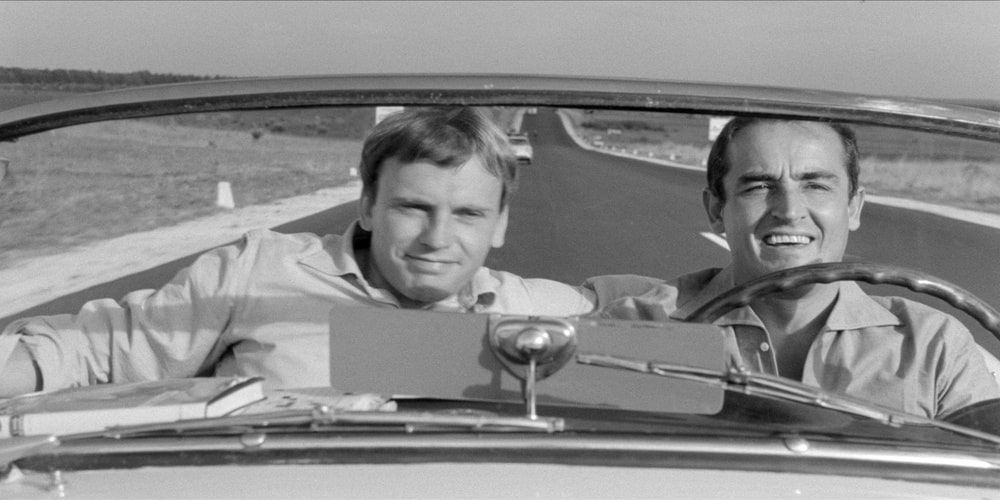
Il Sorpasso, tra i più famosi film estivi italiani
Il Sorpasso is tragic-ending-dramedy signed by the master director Dino Risi, from the late Neorealism period, where the star is of course Vittorio Gassman in one his most famous roles.
It is 1962 in Rome, at the time of La Dolce Vita, on a very hot Assumption Day (Ferragosto in Italian, a summer vacation day). A thirty-something viveur meets a young and shy university student, who has remained at home to study, and pushes him in a rather rude way to leave with him in his convertible car, in order to reach the beach of Castiglioncello, in the Livorno area.
Il sorpasso is a typical road movie but in a very Italian style, driving us along the via Aurelia between Latium and Tuscany: we initially encounter a torrid, unreal Rome, empty because of the summer exodus, but above all far from the chaos of tourists, which is nowadays almost continuous. Later we encounter the key seaside resorts on the Latium coast, Fiumicino, Ladispoli, Marina di Cerveteri, Santa Severa, and Civitavecchia. In these places there is a fitting portrayal of Italy's economic boom and the earliest forms of modern vacationing among beautiful women in bikinis, hungry for emancipation, and carefree families in the mood for fun and relaxation, taking advantage of a brand new age of prosperity.
This Italian summer movie provide a very different glimpse from present times, but actually not so different.
6. Poor, but Handsome by Dino Risi (1957)
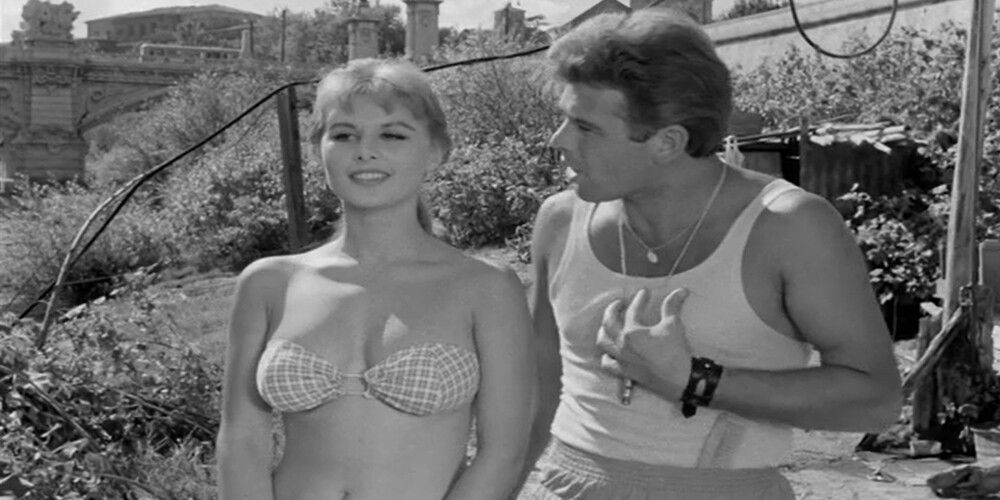
Poor but Handsome, one of the most iconic Italian summer movies
Another famous but very light-hearted and funny work by Dino Risi, it represents a watershed between Neorealist cinema and Italian-style comedy as we know it today.
Poor but Handsome, first part of a successful trilogy, is the story of the rivalry between two historical friends, Romolo and Salvatore, two lazy young Romans who fall in love with the same girl, Giovana.
Risi thus takes us through a splendid oldstyle Rome, completely different from today but always looking alike at the same tume, from the old working-class neighborhood of Piazza Navona to the surroundings of Castel Sant'Angelo. But the main point to represent the authentic Fifties summers is certainly the Tiber river with its bathing establishment, where many people went to sunbathe or enjoy a relaxing swim.
Indeed, what we appreciate the most about this movie, with its quite plain plot, is its journey back to 1957, to a cheerful and genuine city which had left behind the Second World War tragedy, when people were having more to spend on material goods – fancy clothes, record players, vinyls, and silk stockings – and on leisure time.
5. Swept Away by an Unusual Fate in the Blue August Sea or Swept Away by Lina Wertmüller (1974)
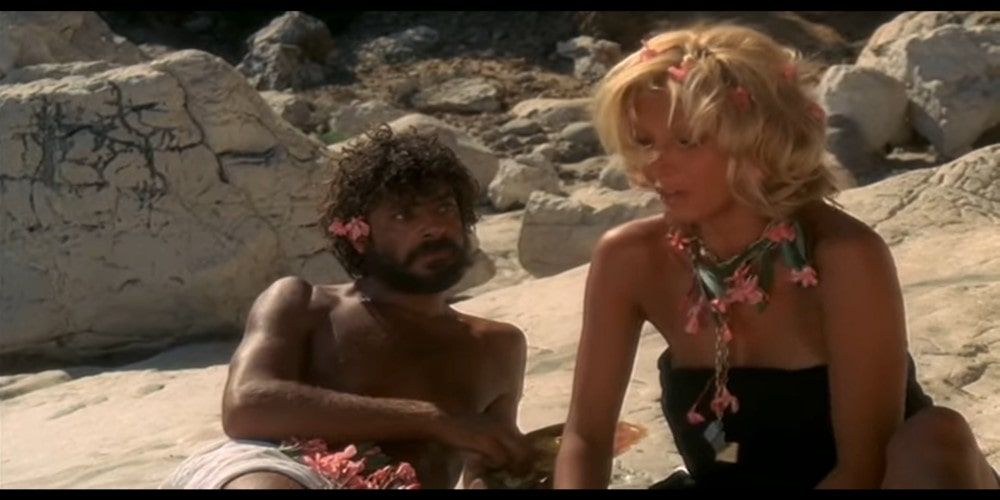
Swept away, iconic Italian summer movie
This Italian summer movie would need no introduction and its immortal fame won over even the British director Guy Ritchie, who shot a remake of it starring his then-wife Madonna, in 2002.
The couple Mariangela Melato and Giancarlo Giannini, sacred monsters of Italian cinema, are respectively a snobbish noblewoman and a rude, communist sailor who are forced by a breakdown of their boat to take shelter on a deserted islet. The two belong to different worlds but will eventually fall in love - at least in that tiny world apart.
This splendid work was shot along the east coast of Sardinia, and more specifically in the Gulf of Orosei, in Cala Fuili and Cala Luna, between Dorgali and Baunei, and in Tortolì, rocky and wild places with the whitest sand and bluest sea that seem to belong to far different longitudes.
4. Time for Loving by Carlo Vanzina (1983)
We are once again in the 1960s, an era that pioneered the “villeggiatura” culture, for this lovely comedy that honors the lazy and joyful atmosphere of that time.
Time for Loving by Carlo Vanzina, king of the Cinepanettone (the typical Italian Christmas movies), tells of the romance adventures of young middle-class Italians who meet every year in Forte dei Marmi to enjoy the summer and who, on the wave of nostalgia, meet here again 20 years later.
Close reconstruction of the typical beach vacation, the movie takes us with smiling tourists on bicycles among the adorable colorful beach villas and tiny hotels, to sample the everyday life on the beach at the bathing establishments, usual gathering places for many families who meet there every year. Along with this come the typical activities, such as ballroom dancing events, Vespa rides and bonfires on the beach. Everything happens by the crystal clear sea of Versilia, a popular destination especially for those years, and it is set to a soundtrack that includes the best hits of the decade - the Italian title itself is a quote from Gino Paoli's song Sapore di sale.
3. August Vacation by Paolo Virzì (1996)
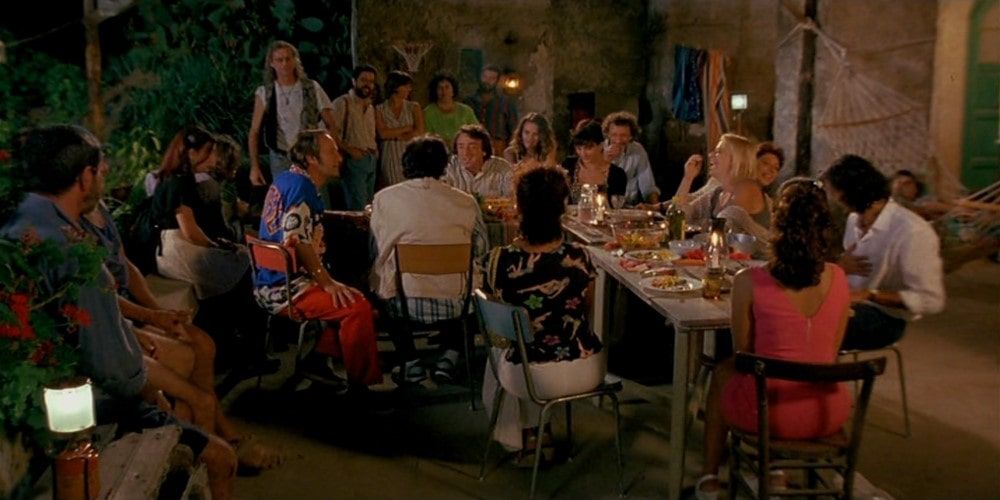
August Vacations, a quite recent Italian summer movie - credits by Wikipedia
August Vacation is only Paolo Virzì's second film, but we can already detect in it the recognizable ironic and disenchanted look at the world and society.
Two distinct groups of people land in Ventotene for their vacation. The former are classic left-wing liberal intellectuals, while the latter are typical vulgar and noisy right-wing townspeople. They end up becoming neighbors, and their apparent diversity will lead them to conflict, but later it will provide a way for each of them to do some personal balancing.
This Italian summer movie is a classic choral work by the Tuscan director who, as he will always do later, uses the contradictions of the human multitude as an excellent way to depict our times; this film is a child of its time, the 1990s, during which Italian politics, society and pop culture were changing radically.
The star of the show, however, is Ventotene, a small island far off the Latium coast that is home to this colorful and sometimes grotesque humanity. Like all small seaside towns, it comes alive after tourists disembark from the ferry but nevertheless manages to retain its wild essence: spartan houses, vegetation among the stones, rocks for diving and an uneasy signal for the TV set.
To complete this nostalgic imagery – which in 1996 did not contemplate nowadays wild tourism yet - the music band in the streets and the events in the main square as a social occasion.
2. Call me by your name (2017)
The melancholy magic of summer romances comes alive in this masterpiece by Luca Guadagnino, who gently leads us into the vibrant 1980s of his native Italy.
Call Me by Your Name, Oscar winner for non-original screenplay, shows us the emotional and sexual maturity of 17-year-old Elio, who in an ordinary summer at the family villa in Crema falls madly in love with 24-year-old Oliver, in a long-running seduction dance.
The warmth of the lovely season can be fully perceived in this intriguing and romantic movie, which takes us away from the classic beach-sea combination but never makes us miss it. The lazy, languid atmosphere comes to life in Crema city and its sun-baked squares, in the country landscapes of the villages Moscazzano, Pizzighettone and Pandino, but also in the alleys of Bergamo and on the placid waters of Lake Garda, in the Sirmione area. Even, especially for the filming, an extraordinary opening was obtained at the Serio Waterfalls near Bergamo.
1. Rose Island by Sydney Sibilia (2020)
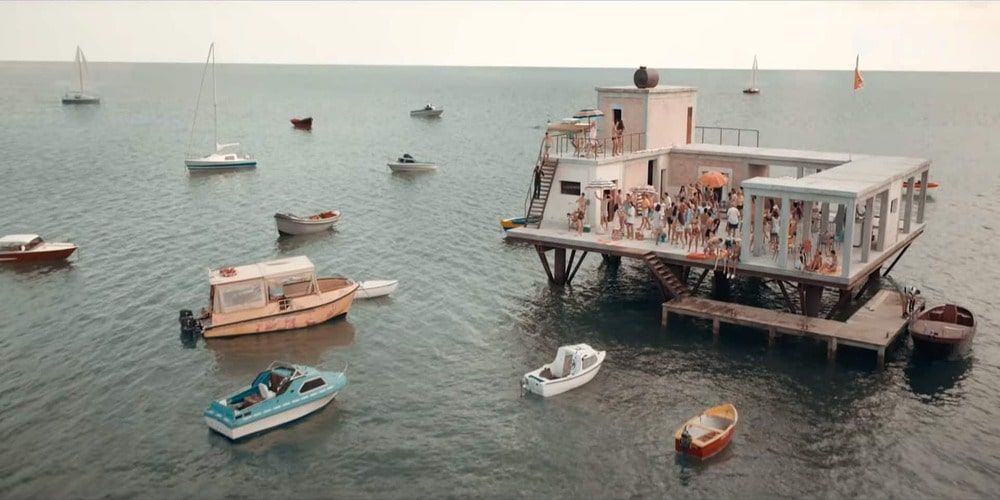
Rose Island, the most recent Italian summer movie
Let's complete our brief excursus on the best Italian summer movies with the newest work, a great success on Netflix. After the brilliant I Can Quit Whenever I Want trilogy, the young Salerno-born director Sydney Sibilia tells another intrinsically Italian story, the absolutely true tale of Giorgio Rosa, a visionary engineer and founder of the Esperantist Republic of Rose Island in 1968.
Here we are again in the 1960s, turning point and subversion time for Italy, and the misunderstood genius Giorgio, who has just earned a degree as an engineer, realizes that the only way to find his place in the world is to, literally, create it for himself: he reaches a platform off the coast of Rimini and founds his own independent micro-nation, where the stringent mainland rules are worthless and can be left behind.
Giorgio's utopia was really born on May 1st 1968 as an independent country and was dismantled on February 11st 1969 by the Navy's bomb squad.
Although the island was never a destination for parties and events in reality, in this story of great ambition and creativity we have a small taste of the fashionable Romagna coast of La Dolce Vita era, of its liberal and playful spirit, of that vacationing and carefree movida of our country in a time of great progress and well-being. But above all, of that fantastic 1968 in which young people desire for escape and independence, having big dreams and few means, gave them a way to think that any plan could be realized.
About the author
Written on 04/08/2023

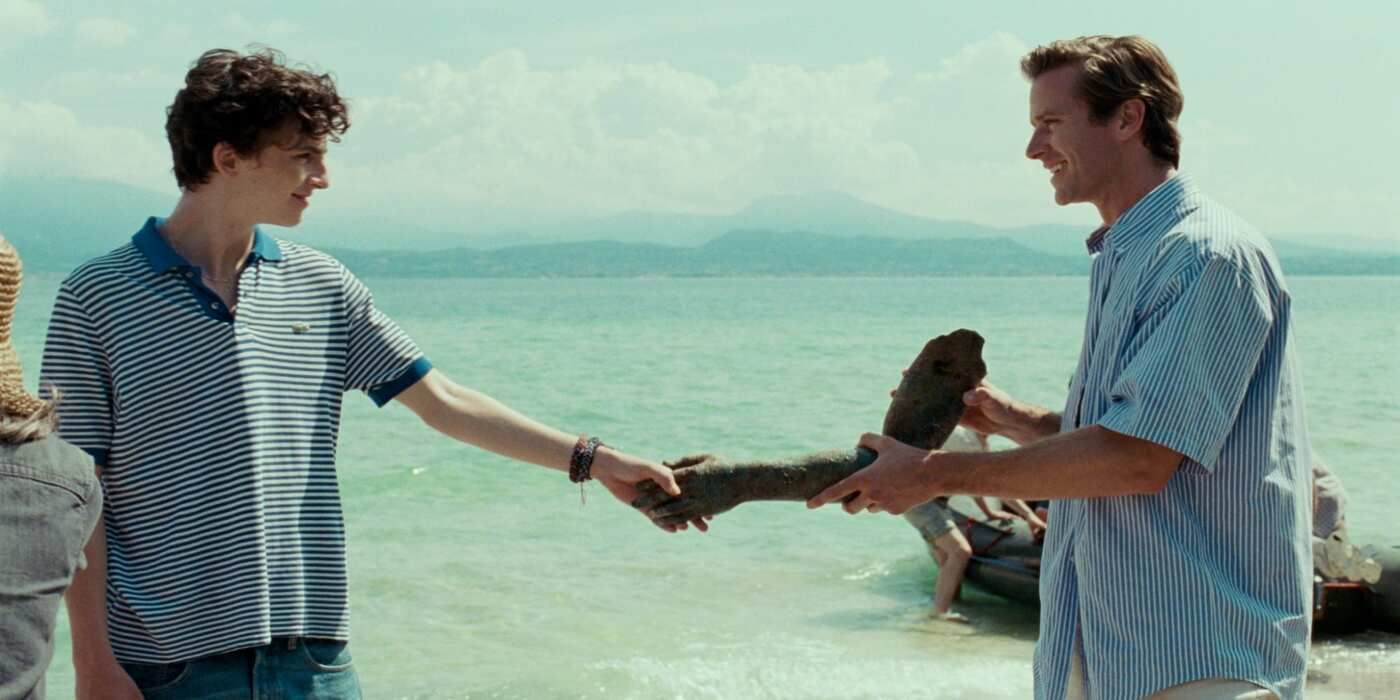

Denise Penna
There is no better way than cinema to discover the authentic Italian vacation spirit: discover the 7 most iconic Italian summer movies.